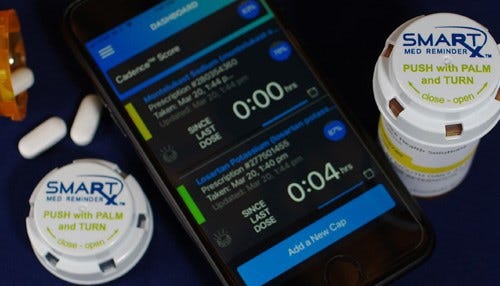Startup’s Goal: No More Missed Meds
 A special cap for prescription bottles lights up and alarms at pre-set dosage times.
A special cap for prescription bottles lights up and alarms at pre-set dosage times.
Subscriber Benefit
As a subscriber you can listen to articles at work, in the car, or while you work out. Subscribe NowAmericans’ forgetfulness is costing billions of dollars. About half of patients don’t take their medications as prescribed, especially with regard to timing, frequency and duration, says the Centers for Disease Control and Prevention (CDC). West Lafayette-based startup Concordance Health Solutions says it’s attacking each of those factors with a technology that connects the patient’s prescription bottle, smartphone and self-motivation to ensure their dose is just what the doctor ordered.
The CDC says direct healthcare expenses associated with medication nonadherence cost about $100 billion to $300 billion annually in the U.S. Purdue Research Park-based Concordance Health Solutions co-founder and Chief Executive Officer Laura Downey says the issue causes increased hospitalizations, additional testing and treatment escalation, because patients aren’t responding to medications that doctors expect to be helping them.
“Most patients think they do decently, or even pretty well, taking their medications regularly, but in reality, they don’t realize how poorly they’re doing,” says Downey. “Medication nonadherence has been the bane of existence for anyone associated with drug delivery for a long time. And I think we’re finally starting to understand some of the underlying factors—the issues related to patients that have to be resolved.”
The startup says patients armed with its recently-launched technology, called Smart Med Reminder, have an average adherence rate of 92 percent and are consistent long-term. Unleashing the power of the Internet of Things and cloud technology, Smart Med Reminder features a special cap for prescription bottles that lights up and alarms at pre-set dosage times; using Smart Med software, the pharmacist scans a QR code or bar code to program the bottle cap at the pharmacy when dispensing the medication.
“[The cap] alarms for a minute, then chirps for another couple hours until you open the cap,” says Downey, “so it won’t stop nudging you until you actually take your medication.”
The cap also communicates with a smartphone app that simultaneously sends notifications reminding the patient it’s time for a dose, until the system detects that the cap has been removed. Patients can track their adherence, and with their permission, the system will share information—or alerts about a missed dose—with their personalized network, such as family members, doctors or pharmacists. The app also delivers educational messages to help motivate the patient to stay on track.
“Using [Smart Med] with medications for common chronic conditions like hypertension, diabetes and mental health disorders can make a huge impact on treatment outcomes, because of that better adherence,” says Downey. “That’s where the real cost savings are going to show up.”
Downey says patients using the system discover that medication adherence leads to better results and enjoy using a product that “does the remembering for them.” Within the app, the patient can earn a score based on their adherence, and she says some see it as a game to maintain a high score. The startup plans to incorporate rewards for patients who maintain good scores, such as co-pay reductions, prizes sponsored by pharmaceutical companies and rewards from healthcare insurers.
“We’re much more than just a reminder; the combination of interventions makes us unique. We’re providing education, social support and incentives for patients to think about this differently and be engaged with the product. We’re also information-sharing with the healthcare team in a way that brings them into the solution,” says Downey. “We’re combining [these features] into something that’s much more comprehensive and is designed to affect a real and lasting behavior change.”
The startup says the system is inexpensive; manufacturing costs are low for the caps, which are also disposable.
“It’s affordable for patients, and more specifically, for payers and employers who are funding the cost of healthcare insurance, to be able to adopt it for a large population of patients to produce real savings,” says Downey. “Our hope is insurers and employers will adopt this technology as part of their overall healthcare plan offering.”
About a dozen Indiana pharmacies have installed Smart Med, and the startup is working to collect evidence of its value to customers.
“Compared to other products on the market, we think Smart Med is truly better in its ability to affect patient behavior, the cost and ease of use of our system,” says Downey. “We’re excited about finding those early adopters and innovators in the marketplace that want to approach this problem differently.”
Downey says she and Concordance Health Solutions co-founder Steve Klink have interesting backgrounds that made them realize the need for the technology.
Downey says the startup is partnering with researchers in several fields to ensure Smart Med attacks the problem from multiple angles.
While missing doses is an issue, Downey says taking medications at irregular time intervals is also problematic.
